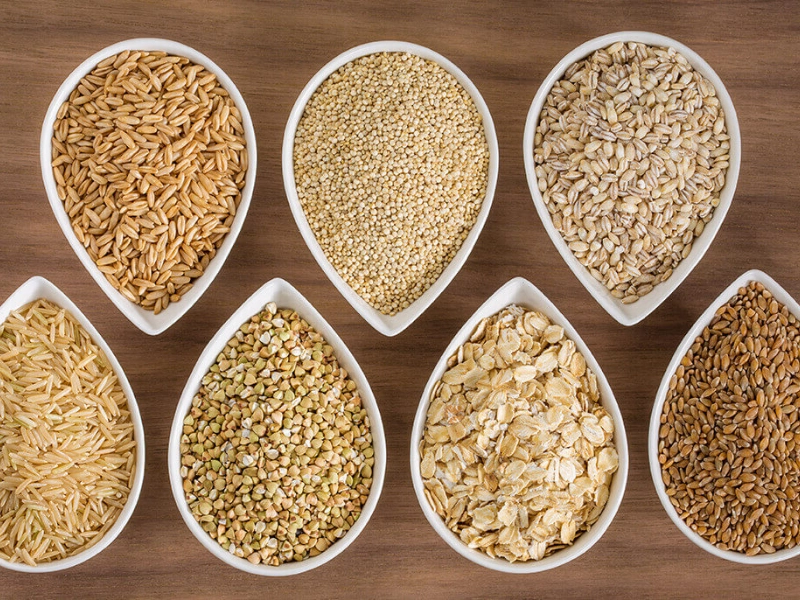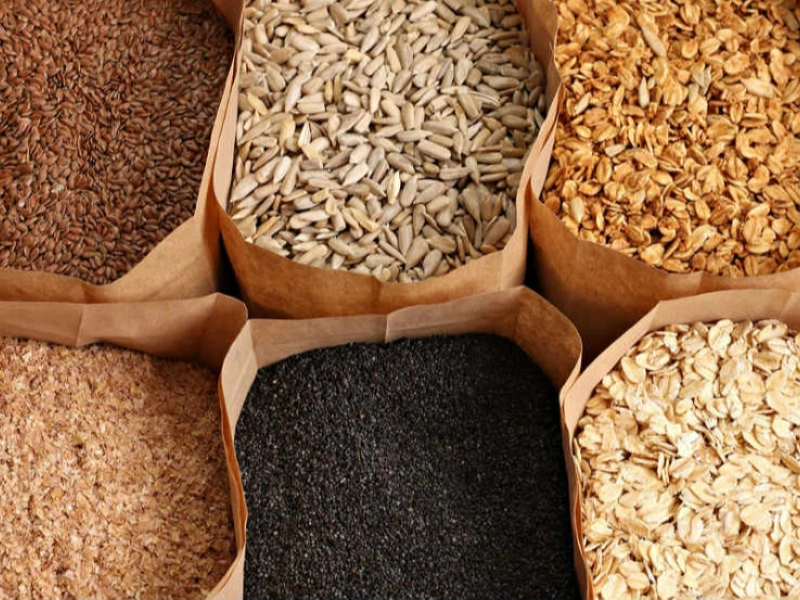Grains and Longevity: Their Role in Promoting Good Ageing
Although they have been wrongly included in the reaction against carbohydrates, grains are a vital component of a balanced diet. A whole foods diet may extend a person's life by up to 13 years for both men and women, according to a recent modelling study. Consuming more whole grains can help reduce inflammation in the body, which is linked to ageing and an increased risk of disease. Additionally, slow-release energy from whole grains keeps us energised for longer.
Reduced Heart Disease Risk

Reduced Cancer Risk
 Antioxidants can be found in grains, particularly in bran, which is high in vitamin E and other anti-inflammatory plant components. These substances lessen the inflammatory reaction that occurs in your body, which lowers the risk of cancer and heart disease.
Select whole grains over refined ones. To identify foods that contain whole grain products, look for the Oldways Whole Grain stamp or read ingredient labels.
According to a modelling study, you can extend your life by as much as thirteen years by adopting a healthy diet that includes whole grains instead of the "typical western diet," which has few legumes, little to no fibre, fruits, vegetables, or nuts. This holds true for both genders.
Antioxidants can be found in grains, particularly in bran, which is high in vitamin E and other anti-inflammatory plant components. These substances lessen the inflammatory reaction that occurs in your body, which lowers the risk of cancer and heart disease.
Select whole grains over refined ones. To identify foods that contain whole grain products, look for the Oldways Whole Grain stamp or read ingredient labels.
According to a modelling study, you can extend your life by as much as thirteen years by adopting a healthy diet that includes whole grains instead of the "typical western diet," which has few legumes, little to no fibre, fruits, vegetables, or nuts. This holds true for both genders.
Reduced Diabetes Risk
 The dietary pattern linked to lifespan comprises moderate consumption of whole grains, fruit, fish, and lean meats and decreased consumption of nuts, red meat, and beverages sweetened with sugar. Male life expectancy increases by 8.9 years and female life expectancy increases by 9.4 years when a persistent dietary change to this longevity-associated diet is made, after accounting for variables such as age, smoking status, body mass index, and exercise.
Whole grains provide nutrients that support several positive health outcomes, such as a decreased risk of type 2 diabetes. Because whole grains have a lower glycaemic index than refined grain products, they give the body energy that is released gradually.
The dietary pattern linked to lifespan comprises moderate consumption of whole grains, fruit, fish, and lean meats and decreased consumption of nuts, red meat, and beverages sweetened with sugar. Male life expectancy increases by 8.9 years and female life expectancy increases by 9.4 years when a persistent dietary change to this longevity-associated diet is made, after accounting for variables such as age, smoking status, body mass index, and exercise.
Whole grains provide nutrients that support several positive health outcomes, such as a decreased risk of type 2 diabetes. Because whole grains have a lower glycaemic index than refined grain products, they give the body energy that is released gradually.
Reduced Chance of Alzheimer's
 There is a connection between a diet high in whole grains and a decreased risk of Alzheimer's. Despite the complexity of Alzheimer's disease causation, certain factors—such as socialising, maintaining a healthy lifestyle, and getting enough exercise—can lower the risk.
Consuming whole grains, such as quinoa, buckwheat, spelt, and barley, is an easy approach to increasing your intake of these vital nutrients. Read food labels carefully and select goods where the ingredient list prioritises whole grains. Eating an abundance of fruits, vegetables, and lean proteins is also crucial.
There is a connection between a diet high in whole grains and a decreased risk of Alzheimer's. Despite the complexity of Alzheimer's disease causation, certain factors—such as socialising, maintaining a healthy lifestyle, and getting enough exercise—can lower the risk.
Consuming whole grains, such as quinoa, buckwheat, spelt, and barley, is an easy approach to increasing your intake of these vital nutrients. Read food labels carefully and select goods where the ingredient list prioritises whole grains. Eating an abundance of fruits, vegetables, and lean proteins is also crucial.
Reduced Osteoporosis Risk
 Your longevity can be greatly increased by including whole grains in your diet. According to a modelling study, you can extend your life expectancy by up to 13 years by regularly consuming a nutritious diet that is high in legumes, whole grains, seafood, fruits, and vegetables, low in red meat and sugary drinks, and contains a handful of nuts.
Consuming foods from the Blue Zone, such as most whole grains, beans, and starchy tubers, can significantly lower your chance of developing cancer, heart disease, diabetes, respiratory conditions, and digestive disorders. It might also assist you in keeping your weight in check.
Your longevity can be greatly increased by including whole grains in your diet. According to a modelling study, you can extend your life expectancy by up to 13 years by regularly consuming a nutritious diet that is high in legumes, whole grains, seafood, fruits, and vegetables, low in red meat and sugary drinks, and contains a handful of nuts.
Consuming foods from the Blue Zone, such as most whole grains, beans, and starchy tubers, can significantly lower your chance of developing cancer, heart disease, diabetes, respiratory conditions, and digestive disorders. It might also assist you in keeping your weight in check.
Reduced Chance of Stroke
 A diet high in fruits, vegetables, and whole grains may lower the risk of stroke, according to studies. This is mostly because of the high dietary fibre content of these foods, which lowers inflammation and aids in the prevention of blood clots.
Additionally, beta-D-glucan, a form of antioxidant found in grains, supports the health of blood vessels. By including these foods in your diet, you may be able to reduce your risk of heart disease and stroke dramatically. According to one study, women's life expectancy can rise by up to eight years if they begin eating a diet high in nutrients at the age of twenty.
A diet high in fruits, vegetables, and whole grains may lower the risk of stroke, according to studies. This is mostly because of the high dietary fibre content of these foods, which lowers inflammation and aids in the prevention of blood clots.
Additionally, beta-D-glucan, a form of antioxidant found in grains, supports the health of blood vessels. By including these foods in your diet, you may be able to reduce your risk of heart disease and stroke dramatically. According to one study, women's life expectancy can rise by up to eight years if they begin eating a diet high in nutrients at the age of twenty.
Dementia Risk Reduction
 A diet high in fruits, legumes, and whole grains is linked to a decreased risk of dementia. In actuality, life expectancy was increased by more than five years when this ideal diet was substituted for a "typical Western diet."
Consuming whole grains may be especially helpful in the fight against dementia since they retain the bran, germ, and endosperm. The hard outer layer, known as the bran, is where fibre, B vitamins, and antioxidants are found. Only the high-carb endosperm remains in refined grains, which are plundered during processing, omitting this important portion of the grain.
Food-frequency questionnaires were utilised in this study to examine participant dietary patterns. While those without dementia had more varied diets, those who got dementia had food "networks" that were concentrated on deli meats, starchy foods like potatoes, and alcohol.
A diet high in fruits, legumes, and whole grains is linked to a decreased risk of dementia. In actuality, life expectancy was increased by more than five years when this ideal diet was substituted for a "typical Western diet."
Consuming whole grains may be especially helpful in the fight against dementia since they retain the bran, germ, and endosperm. The hard outer layer, known as the bran, is where fibre, B vitamins, and antioxidants are found. Only the high-carb endosperm remains in refined grains, which are plundered during processing, omitting this important portion of the grain.
Food-frequency questionnaires were utilised in this study to examine participant dietary patterns. While those without dementia had more varied diets, those who got dementia had food "networks" that were concentrated on deli meats, starchy foods like potatoes, and alcohol.









